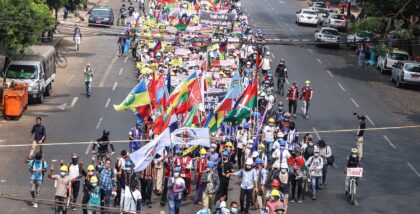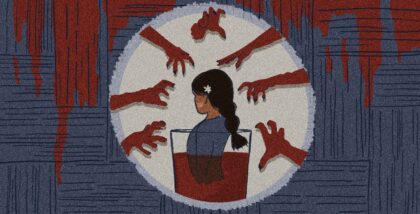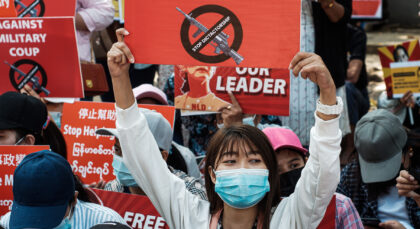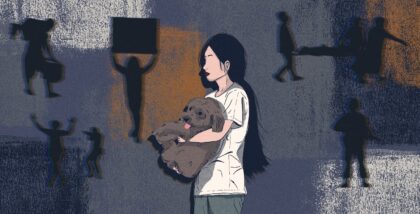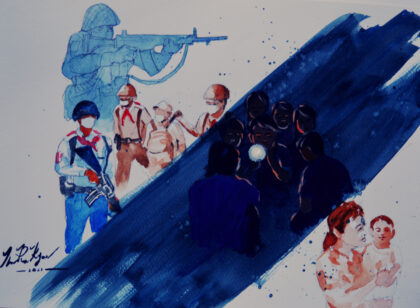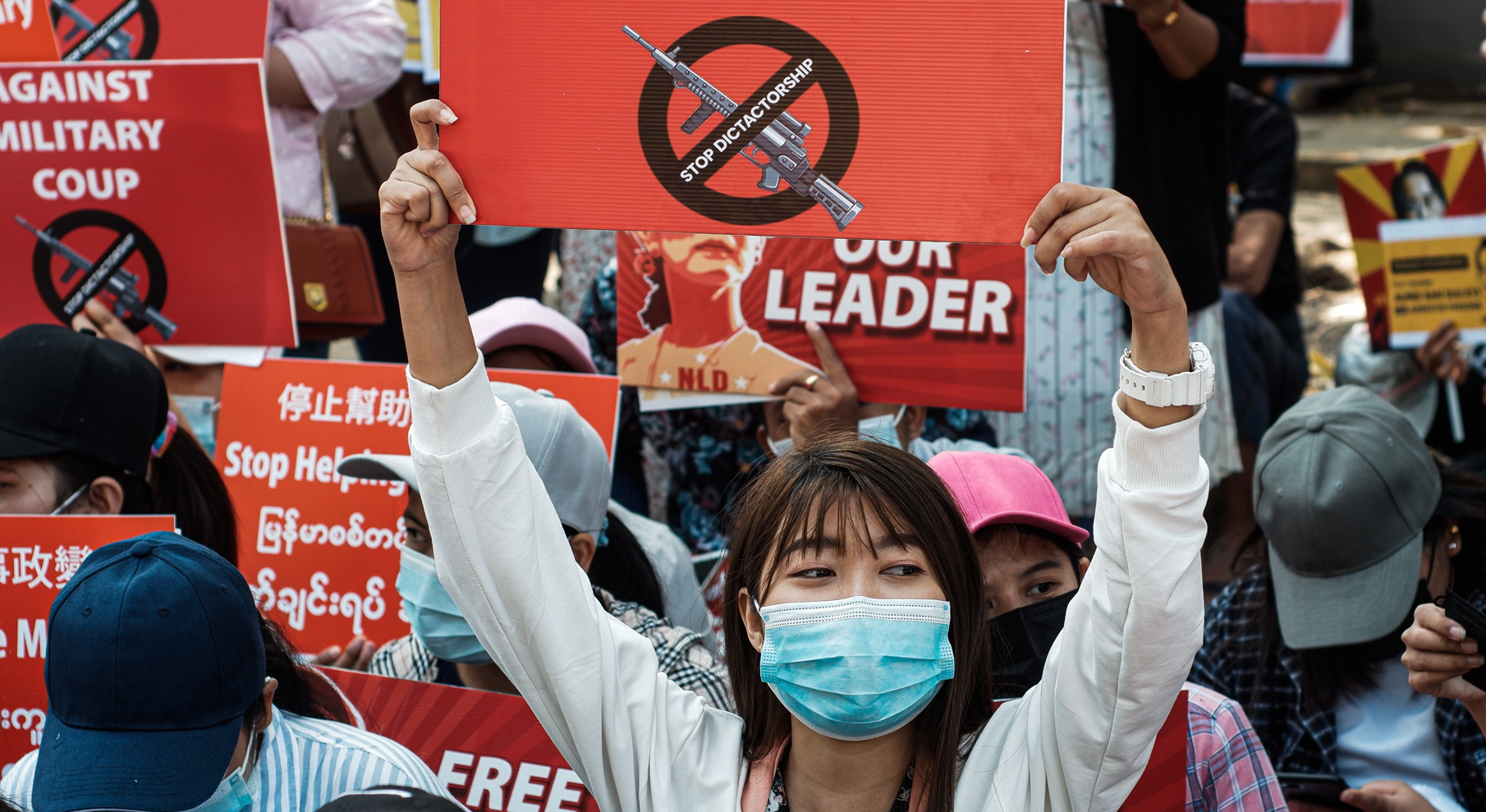 Protests in Myanmar against the military coup (wikimedia commons)
Protests in Myanmar against the military coup (wikimedia commons)
Complacency and compromise are often two sides of the same coin when it comes to war. Complacency can drive violence, while compromise can arrest it. When it comes to Myanmar, complacency by Western governments and the United Nations has undeniably enabled both the Myanmar military’s genocide of the Rohingya, and its merciless coup d’état in February 2021.
To be sure, the military, known as the Tatmadaw, is ultimately responsible for torching Rohingya homes in Rakhine and killing civilians on the streets of Yangon. But the uncritical satisfaction with which western powers approached Myanmar’s decade-long democratic transition prevented them from smelling the genocidal rot at the core of the country’s dominant political institution. That smugness licensed the European Union to get drunk on the idea that war criminals could turn into human rights defenders; it seduced the Americans and the British into seeing Aung San Suu Kyi as a savior-in-waiting rather than an apologist-for-genocide; and it assured high-ranking United Nations officials they would never be held to account for covering up the Tatmadaw’s crimes in Rakhine State.
In the interview below, I talk with Thin Lei Win, the prominent Burmese journalist, about how the Myanmar military stunned the world earlier this year by overthrowing and jailing the country’s elected government and then waging a withering campaign of violence against protestors. For her, the real surprise wasn’t so much the coup itself, but rather the complacency at the heart of the global response to the violence unravelling the country today. She says the West and the UN “were lulled by a situation where the military was playing party politics for ten years. Their fundamental mistake was believing the military would see the benefits of the political transition, and would not go back from where it came.” However, for those like Myanmar’s long-persecuted ethnic minorities, the coup, she says, wasn’t a surprise at all, but simply a reversion to the mean.
In 2015, Thin Lei Win, with support from the Thomson Reuters Foundation, founded Myanmar NOW, an independent news service providing deeply researched articles, in both Burmese and English, to help the world make sense of Myanmar’s tumultuous political transition from a dictatorship to a democracy. At the time, Aung San Suu Kyi’s National League for Democracy (NLD) was on the verge of its first landslide election victory. Now, in the aftermath of an even bigger win at the polls, the Tatmadaw has decided to turn back the political clock. For Thin Lei Win, that move is best explained by the Tatmadaw’s top general Min Aung Hlaing’s abiding sense of insecurity with Aung San Suu Kyi. She points to a constitutional guarantee jealously guarded by the Tatmadaw, which reserves 25 percent of seats for the military in both houses of parliament, effectively giving the armed forces veto power over any constitutional changes. Thin Lei Win said, “The NLD’s [second landslide] victory chipped away at the Tatmadaw’s perception of its own popularity and hold over parliament,” sparking fears among the generals that Aung San Suu Kyi and her party might seek to change the constitutional status quo. Whether that threat was real or perceived, Lei Win explained that Min Aung Hlaing appears “willing to wreck everything to hold onto to power.”
Born and raised in Yangon, Myanmar, Thin Lei Win has written about her country for nearly two decades. She left Myanmar NOW in 2016 and is currently a freelance correspondent covering food security and the climate crisis. Thin Lei Win is also the co-founder of the nonprofit storytelling project The Kite Tales, which chronicles the lives and histories of ordinary people across Myanmar. I spoke with her in April, in the aftermath of the Tatmadaw killing six civilians in Sagaing. We discussed the trajectory of Aung San Suu Kyi and the opposition, the public’s fear of being cut off from the world again, and the prospect of a grand compromise among the country’s long-divided ethnic groups to build a more tolerant Myanmar.
Michael Shaikh is a human rights activist, writer, and Adi Magazine board member who previously led the UN’s investigations into the Rohingya genocide. He has worked for Human Rights Watch and the International Crisis Group.
*
Michael Shaikh: What did the coup show us? What should we be taking away from the situation in Myanmar now?
Thin Lei Win: The Tatmadaw alleged election fraud in the 2020 elections. They were flawed but not fraudulent, not in the way the Tatmadaw was accusing, anyway. I think the election results showed two critically important things. One, the overwhelming NLD victory points to just how deeply unpopular the military and the USDP [the United Solidarity and Development Party, the Tatamdaw’s proxy party in parliament] are. Two, there is now no viable path for the generals to turn civilian, join the USDP, and remain in control of Myanmar. I think the coup demonstrates that the Tatmadaw understood if they continue with electoral politics, there’s just no way forward for the USDP; they’re just not going to win, ever.
Michael Shaikh: Why the coup now? Weren’t the NLD and Aung San Suu Kyi useful for the Tatmadaw? In December 2019, as de facto leader of Myanmar, Aung San Suu Kyi defended the Tatmadaw in front of the International Court of Justice against charges of genocide during a military campaign in 2017 in which thousands of Rohingya were killed and raped and hundreds of thousands displaced. She was willing to take the blame and defend the generals and their crimes. Was that not good enough for them?
Thin Lei Win: I know, exactly. For me it was like, “Look, she went to the Hague. She defended the indefensible. What more do you want, right?”
Michael Shaikh: Right. So is the coup best explained by the military realizing that it had no path to power through electoral politics?
Thin Lei Win: More or less. But there seemed to be other factors at play as well. Apparently, there’s a personal animosity between Daw Suu and Min Aung Hlaing, the army chief. And it seemed like she and the NLD were unwilling to play ball with his request to become president, which under the constitution would give him a huge amount of power, even as a civilian. From what I can piece together, the NLD wasn’t willing to give way because from where they sat they won the election fair and square. Aung San Suu Kyi and the NLD were in a very strong position of power. So what’s the point then in letting Min Aung Hlaing [the army chief] take over?
Michael Shaikh: How similar is today’s situation to the 1990s, where there was also an elected government in exile and facing off against a military regime, like the National Unity Government (NUG), which formed in opposition to the coup in February 2021 and claims to be the legitimate government of Myanmar?
Thin Lei Win: This is very different to that time. In the 90s, the country of Myanmar was still closed off to most of the world. We only heard of what was going on through nightly radio broadcasts from the BBC or the VOA. At the time, you had to be very careful when you listened. We had to close all our windows before we started listening to the broadcast, because we didn’t want people to hear. The fear was that people walking past the house could report us to the army and we’d be arrested.
Whether democracy will return is another question.
Very few of us actually knew what was going on with the parallel government then. It’s very different now. Dr. Sasa [an exiled opposition leader and spokesperson for the NUG, who was previously the Minister of International Cooperation in the NLD government] is very visible and has been extremely popular with young people in Myanmar, particularly those who are active on social media. Plus, many of the NUG’s members are former ministers or members of parliament, who people already know, and they cross ethnic groups. In that regard, it is a different situation to the fear of the 1990s.
But whether they will survive and whether democracy will return is another question. That depends on not just how the international community responds to the coup, but also how it recognizes and deals with the NUG.
Michael Shaikh: We’re talking right in the aftermath of a story published by a news organization you founded, Myanmar NOW, which detailed the military killing six civilians in Sagaing. Now the military’s confirming they’ve killed one, but we have seen more credible numbers from civilians, including victims’ families, on the ground. Can you talk a bit about Myanmar NOW, and how it functions in this kind of closed-off environment?
Thin Lei Win: I set up Myanmar NOW in 2015. Now it is being run and managed completely by a local team. They’re incredibly brave and talented and oh god, yeah, every day I worry about their safety because Myanmar NOW is one of five outlets that have had their licenses revoked by the junta, and one of quite a few media outlets that have been raided. So Myanmar NOW is in the cross hairs of the military.
Normally a media outlet or a journalist would call somebody and say, “I’m writing for this organization. I want to interview you.” Right? Now if you are outlawed, if your license has been revoked, you are operating pretty much illegally, right? You no longer have the license to operate as a media outlet. So you are putting yourself in danger and you are also putting your sources who speak to you in danger.
Making matters worse, journalists in Myanmar now have to worry about offering contact details to potential sources. Military surveillance is tight, and you don’t always know who you can trust. The risk is your number could be passed to the authorities, you could be tracked down, traced, whatever. All sorts of dangers. And yet they’re still reporting, and extremely active, partly because of a new group of citizen journalists that have popped up.
Career journalists are getting a lot of help from ordinary people. It’s amazing how these citizen journalists just with mobile phones have started documenting everything that’s been happening and passing it on to professional journalists. These citizen journalists are informing us—everybody outside the country and inside the country—of what’s happening. In fact, the trust between media outlets and the public is why news outlets like Myanmar NOW and others are able to do some of their reporting.
Michael Shaikh: I am struck by the word “trust,” because I recall during my time in Myanmar a deep mistrust of journalists. Often that mistrust falls along ethnic lines. But there has been this tendency for the public to see journalists as dragging down the image of Myanmar, and by extension sullying the image of Buddhists. Is something new happening?
Thin Lei Win: Absolutely. This is one of the silver linings of the coup. In the past few years it became extremely toxic to be a journalist in Myanmar—unless you were towing the party line. If you question anything about what’s happening in the country, in ethnic areas especially, it just became so difficult. And part of it is because the Burmese—and when I say the Burmese, I’m talking about a lot of the Bamar majority mainly, who feel very protective towards the country, to the NLD, to its leader—there’s this nationalism, and they see questioning the NLD as, “Oh my god, journalists are besmirching the country’s reputation.”
Let me give you an example:
Around 2011-2012, I attended a class set up by an NGO for political prisoners released after spending time in jail. The political prisoners were young when they were arrested in the 1990s and 2000s, around 17, 18, 19 years old. Because they’re political prisoners, they were blacklisted, meaning they could no longer attend university or schools after their release. So NGOs and other groups were helping to educate them, through night classes.
Nationalism is extremely prevalent, either consciously or subconsciously, among everyone in Myanmar.
One of the founders of these schools asked me to come to a class and talk about the media and journalism. I vividly remember this argument I had with one of the political prisoners who’d been released. This young man was arrested and thrown in jail for calling for democracy and an end to military rule. As I was talking about reporting and journalistic ethics, he commented that the media should not report a story if it would bring the country into disrepute. I asked him, “Who gets to decide what is going to bring the country into disrepute?” And also, I am sorry, why should the media be the bad guy when it’s not the media that is doing these bad things. If you don’t want the media to hold you to account then don’t do terrible things! He was adamant the media had a duty to protect the reputation of the country. And that stayed with me. That was way before NLD, even before Daw Suu won the by-elections [in 2012]. That stuck with me because it just felt like the antithesis of what he went to jail for.
I say this all to highlight the nationalism that is extremely prevalent, either consciously or subconsciously, among everyone in Myanmar. I think that came up in a major way around 2017 because of the Rohingya issue, and the media bore some of the brunt of it.
Michael Shaikh: On that note, we’re also seeing another shift when it comes to Rohingya, at least on social media. We’re seeing apologies from some Burmese political leaders for ignoring and denying at best, and condoning at worst, the Rohingya genocide. It appears the atrocities carried out by the military against the Bamar majority has produced a modicum of sympathy for the oppression Myanmar’s ethnic minorities, both in the northeast and the west, have faced for decades. I saw an acknowledgement by some Burmese that the Rohingya were in fact Myanmar citizens. Dr. Sasa even said that the country had done wrong by the Rohingya.
Thin Lei Win: Yes, Dr. Sasa, if I remember correctly, said in a Facebook post, “There will be justice for our Rohingya brothers and sisters.” It was really quite a step forward.
Michael Shaikh: How meaningful is this?
Thin Lei Win: I really do think the needle has moved. To what extent? That’s the question. And to what extent will the Rohingya be seen as a true Myanmar ethnic group? That is a big question. But the needle has definitely moved. People are no longer referring to what happened in 2017 as propaganda and lies from people in the pockets of the OIC [Organisation of Islamic Cooperation]. Because that’s what it used to be. It’s been interesting to see the media report stories about Burmese Buddhists, young people, who have come out to say, “I’m really sorry. We’re really sorry we didn’t speak out,” particularly with regards to what happened with the Rohingya, but also to other ethnic minority groups. But just to be clear, not everyone feels this way.
Michael Shaikh: I’ve seen some of that and I have to say that after investigating the genocide, it’s overwhelming, and, frankly, hard to believe.
Thin Lei Win: I know, I know.
Michael Shaikh: Many Rohingya in Bangladesh and here in the US have told me they want to believe it. I can see glimmers of hope come through their texts, hope that this will translate into a homecoming and maybe even citizenship. Does this have traction? Because others have conveyed a deep skepticism, a feeling the Bamar are being opportunistic, and when this all calms down, the status quo will return.
Thin Lei Win: Yeah. And I think that it is a very well-founded fear. And I will tell you why. Some of the people in the National Unity Government have publicly defended what happened to the Rohingya. The Minister of Relief and Resettlement [in the NLD government before the coup], now in the NUG, accused the Rohingya of burning down their own homes. And then the Deputy Defense Minister, also in the NUG, said on social media how she justified what happened in Rakhine as cleaning out an infestation of bugs from your home.
So you see there are seriously problematic things here. There are definitely people in the NUG who are a real concern. They need to own up these comments. But there are also people like Dr. Sasa who have been saying “This is wrong.” And Ei Thinzar Maung, [a member of the NUG and the current Deputy Minister of Women, Youths and Children Affairs] who was one of the very few people to actually protest when Daw Suu was in the Hague and say, “No, we stand against genocide.”
So I think things have improved, but we are starting from an extremely low base.
Michael Shaikh: We’re seeing a sense of recognition by the Bamar majority that careful attention should be given to the plight of ethnic minorities. How does this all sit with the Buddhist clergy, who’ve played a leading role in past pro-democracy demonstrations, like the Saffron Revolution in 2007, but also been vociferously anti-Rohingya, anti-Muslim?
Thin Lei Win: I have actually not seen any big famous abbot come out to say “I apologize for the Rohingya.” They definitely have not. And there has been a lot of controversy over some of the monks. The Sitagu abbot, he’s been pictured with the junta leaders and there’s quite a lot of people who are really upset about that. [The Sitagu Monastery is among the most influential Buddhist centers in Myanmar.]
One thing you keep hearing is bone yan thu, which essentially translates to “common enemy.” Whether you’re talking about the Rohingya issue, or ethnic issues, or religion, they’re all like, bone yan thu, remember the common enemy is the Tatmadaw.
There’s been backlash against another monk, who in a viral Facebook post was seen as giving permission to Min Aung Hlaing and his wife to stage a coup. Another abbot apparently said something along the lines of, “the military has been able to hold onto power because they’ve put Buddhism above all else,” and sort of criticized the trajectory of Myanmar. Roughly translated, he said: “If Burma becomes more developed, people will become less religious.”
A lot of people are really angry because some monks want Myanmar to continue to be poor, thinking that that’s how religion will continue to play a very important role in daily life.
On the other hand, people are saying, “This is the strategy of the junta, to divide and rule. They’re just dividing all the Buddhists. Let’s not argue about this.” And so one thing you keep hearing is bone yan thu, which essentially translates to “common enemy.” Whether you’re talking about the Rohingya issue, or ethnic issues, or religion, they’re all like, bone yan thu, remember the common enemy is the Tatmadaw.
Michael Shaikh: So are we seeing a new type of organization of ethnic nationalist movements across Myanmar? Are they talking to each other?
Thin Lei Win: The NUG is the closest manifestation of that. If you look at the cabinet members, it is possibly the most diverse in terms of ethnicity that we’ve had. There are a lot of problems though, the obvious being there’s no Rohingya, no Rakhine, and not enough Shan represented. The NUG is supposed to have a consultative body that’s inclusive of the protestors, the EAOs [Ethnic Armed Organizations], the ethnic civil society. It’s supposed to represent a broad swathe of people and ethnicities and religious groups in Myanmar. Some groups have chosen to join the NUG, and others like the Rakhine have not, but the fact that representatives from major ethnic groups are not included is a pretty big flaw.
Obviously there are still questions about how politically representative the NUG is, because a lot of its members are from the NLD. But having said that, in terms of its makeup, it is much better than the last few cabinets or governments we’ve seen.
Michael Shaikh: Are we seeing any kind of practical coordination in terms of politics?
Thin Lei Win: There are layers to the movement. Aside from the formal political structures like the NUG, you also have the protestors on the ground. There are quite a lot of different groups across geographical regions. Some of them are just protesting on the streets, doing what they call guerrilla-style protests, coming out in small groups, demonstrating, taking pictures to inform the world of what’s happening, and then disappearing.
And then you also have the Civil Disobedience Movement (CDM), which is different from the protests in that they’re not coming out on the streets. It’s boycotts, people just not going to work. And that’s happening all around the country. It’s not exactly leaderless, but there isn’t a single one person who is leading everything, not like Daw Suu in 1998.
But there are people who have captured people’s imagination, like Ei Thinzar Maung, who is part of the NUG. She was one of the first to organize large-scale protests on February 6. And she’s also always been pro-Rohingya, pro-ethnic. Really progressive. There’s another guy called Tayzar San in Mandalay who’s a doctor; he’s part of the Civil Disobedience Movement. He was quoted in a Foreign Policy article talking about how he now feels solidarity with the ethnic groups, now understanding what they had to go through. Another is Wai Moe Naing, a Muslim from Mandalay. People love him. He was recently arrested, which I think was a very big blow. But people are still demonstrating.
So I think in many ways, this is a good situation. We’ve seen what happens when you just put all your eggs into a single basket, right? It’s good to have a lot of people, a more organic movement, and more than just a single leader.
Michael Shaikh: What about acts of armed resistance on the ground?
Thin Lei Win: Yes, there has also been a surge in armed resistance and we’ve seen particularly brutal crackdowns by the junta in Sagaing, Chin, and most recently, Kayah. This is obviously a really worrying development because it means further bloodshed is likely.
Michael Shaikh: It does feel significantly different from previous moments of resistance in Myanmar’s history. And practically it looks different on the ground. Is this something that the Tatmadaw can overcome? We’re seeing its willingness to openly kill civilians on the street. I mean that’s nothing new. How does this sit with the rank and file soldiers? Is it causing any factionalism or defections within the army itself?
Thin Lei Win: Soldiers have defected. The interesting thing coming from the media interviews with these defectors is that all these internet shutdowns were as much about controlling the information flow within the army itself as they were meant to stop people from telling the world what’s going on. It’s a way to stop the soldiers themselves from seeing the horrors that are being inflicted on people. They clearly don’t want soldiers to know the extent of the opposition or how violent and vicious some of the troops have been.
Of course, at the moment, the number of defections are still very, very, very small. And it’s really hard to extrapolate from just a handful of interviews what the Tatmadaw thinks. But almost everyone so far who has defected, and again it’s a tiny number, what they have said is they think most rank and file soldiers do feel some sympathy with the pro-democracy movement. But they are either fearful of what’s going to happen to their families if they defect or they are being promised riches and property for not doing so.
And of course there are also soldiers who I’m sure truly, truly believe that the Tatmadaw is the only force holding Myanmar together. That’s their propaganda, that’s what they’ve been saying. The charges against Daw Suu and the NLD about electoral fraud also have a strong xenophobic element, that she and her party are selling the country to foreigners, that the military is the only institution capable of protecting the country’s independence. I’m sure there are quite a few people who actually buy into that.
But people who know the army way more than I do have said they don’t actually see the Tatmadaw cracking, at least not any time soon, which is really depressing.
Michael Shaikh: What about the opposition movement. Can it hold?
Thin Lei Win: I think at the moment, like I said, there has been so much focus on the common enemy. The Tatmadaw is the common enemy. I don’t really see the opposition or the pro-democracy movement, whatever you want to call it, fracturing anytime soon. Not in a big way anyway. There might be disagreements, particularly over ethnic communities or Rohingya. But everybody still agrees that the Tatmadaw is worse than anything else. The energy is on fighting them. And I don’t think that’s going to change.
Michael Shaikh: The fundamental nature of this resistance movement is different than in the past. Could it overwhelm the Tatmadaw?
Thin Lei Win: The Tatmadaw has been such a closed institution, so it’s hard to guess. But some of the guys who have defected have also said a lot will depend on the NUG and its idea of creating a federal army. Essentially if it looks better than the Tatmadaw to the rank and file soldiers, then they might join. There’s a lot of talk about it. But I feel like that’s quite a long way away, for a federal army to actually come into fruition.
What might change things considerably is if the ethnic conflicts along the borders intensify. The question is then will the Tatmadaw be overstretched between fighting in the border areas and the big cities? What will they do then?
But it’s unclear if there’s appetite among the EAOs [Ethnic Armed Organizations, like the Kachin Independence Organization] for that; there are a lot of competing interests. But if a large majority of EAOs start really pushing and then there’s also a more physical confrontation within the cities, I do wonder how much longer the military will last, if it is stretched on all fronts.
I think the West was in need of a good news story, a feel-good story, and Myanmar fit the bill.
Michael Shaikh: What do you think the future holds for Aung San Suu Kyi and the NLD?
Thin Lei Win: The NLD has many shortcomings, and they’ve done a lot I disagree with. Regardless, they are still the democratically-elected party with the largest number of elected members of parliament. We can’t discount them, nor can we discount Aung San Suu Kyi, because for many, many people, particularly the ethnic Bamar majority, she is still the embodiment of something better than the junta—a free Myanmar.
Nevertheless, I think, in the short and medium term, it’s hard to see exactly how they’re going to operate. A lot depends on what happens with the National Unity Government—whether the international community recognizes them and works with them and makes it easy for them to operate.
That said, the military announced they would remain in power for one to two years before holding new elections and transferring power. Even if there’s another election, I think what they really want is a repeat of the 2010 polls where the NLD boycotted. They want to remove Aung San Suu Kyi and her NLD from politics, thus clearing the way for the USDP to take control of parliament and deliver the presidency to Min Aung Hlaing after retiring as commander-in-chief.
I think the military just wants to decimate the NLD and ban Daw Suu from politics, because as long as they’re free to operate, there’s no way the USDP is ever going to win.
Michael Shaikh: Since 2010 and the push towards democracy, there’s been a tendency, particularly by Western countries, to give the military the benefit of the doubt when it comes to democracy and human rights, to trust they’ll fix things. Will this new level of violence change that approach?
Thin Lei Win: I don’t know. I think the West was in need of a good news story, a feel-good story, and Myanmar fit the bill. You’ve got these horrible military atrocities in 2017 in Rakhine, and earlier in 2012, 2014, and 2015. Despite that there was still this hope that maybe things will change if the NLD fully takes control of the government. You know, Daw Suu is extremely telegenic. There’s such a typical David and Goliath story, you know, of this lone, brave woman against a powerful and brutal military. There’s also this aspect of Myanmar being seen as a beautiful, exotic country. So ripe with stereotypes and tropes, right? It is so easy for people to fall into it. They shouldn’t have. But they wanted a quick win—they as in the West, Europe, and the US. And they thought this was it and jumped in without asking questions.
I think the desire to believe the military were dedicated reformers was just so strong that they were willing to ignore history.
Whether or not the West has changed the way it sees Myanmar, I don’t know. I hope western powers can see that the Tatmadaw has never reformed. It is bloated, it is unaccountable. It’s never had to account for its actions. It does not belong in the 21st century. But then the question, of course, is what happens to it?
Michael Shaikh: Yes.
Thin Lei Win: The Tatmadaw has painted itself into an absolute corner. They’ve already killed a lot of people; they’ve already done so much damage. They know that if they back down, they’re going to lose everything.
But people want to tear up the constitution, which guarantees the military seats in parliament. No one wants them in parliament whatsoever. So they could lose whatever privileges that they used to have before. The people, not just protestors, are incredibly angry. Even people who I’m speaking to who are not young, who are not part of the protestors, not part of the CDM, even they’re saying “No! No. This time around we don’t want any negotiated settlement with the military.”
Both sides have become so entrenched. And that makes it really hard for the international community, right? Because you need compromise and nobody’s willing to compromise.
Michael Shaikh: Singapore and Thailand in this situation seem to be the ones that are most listened to amongst the Tatmadaw in Myanmar.
Thin Lei Win: Yeah, within the region at least, among its neighbors.
Michael Shaikh: Are they who we should look to for peace negotiations or a reduction in violence?
Thin Lei Win: I personally think so. Obviously, you’ve got the two elephants in the room, China and Russia. But they’re just going to be so hard to convince or persuade, particularly Russia. They’re not just going to listen to anyone. China’s going to be very practical and pragmatic about what it does. So in a way, they might be able to be brought around to see what’s happening as really not ideal.
But Thailand and the Tatmadaw are close. The Thai Prime Minister, Prayut Chanocha, is a former general who staged a coup seven years ago, manipulating the legislature to hang on to power. So I doubt he’s going to actually tell Min Aung Hlaing and Tatmadaw not to do anything that he himself has already done. To be fair, the Thai army has not behaved in the same way towards civilian people as the Myanmar army has done. Myanmar’s army has just been extremely vicious towards its own people. Having said that, both men are coup leaders, both want to hold onto power. So I highly doubt, unless there’s a change in government in Thailand, that it will do anything substantial.
Michael Shaikh: Singapore, Japan?
Thin Lei Win: Singapore has clout. There are a lot of business ties, and it is among the largest investors in Myanmar.
I really don’t think the Tatmadaw is going to come to any negotiating table unless they’re out of options. The only way that happens is if they have nowhere to turn financially and militarily.
They still have options. Look, the Moscow Times just did a story about how the Tatmadaw imported $15 million worth of arms from Russia in February. Thailand, Singapore, and Japan have cut some aid. But I think there’s a lot more that can be done to really apply pressure. And I don’t think we are seeing that yet.
Michael Shaikh: What else would you like people to know about what’s going on?
Thin Lei Win: The world is focused on the coup, the protests, and Daw Suu being arrested, and missing the broader transformation that’s happening within the society, the shift among members of the ethnic majority towards more understanding of the Rohingya and other ethnic groups. I feel like I needed to keep pushing that point because as awful as what’s happening is, this is a significant change. For anyone who cares about Myanmar within the international community, if you want to help, this really does point towards the country’s future potential.
We never had a real chance of forging a common identity that has not been imposed by the junta or the colonial masters.
I say this in the context of nation-building, because Myanmar has never had a real chance at that. There was the feudal kingdom, then the Brits came, then the Japanese, and then the Brits again who left behind insurgencies, Ne Win. We never had a real chance of forging a common identity that has not been imposed by the junta or the colonial masters. Now, with this newfound awareness, there could be a real chance for nation-building. And if it is done right, Myanmar can actually become a really inclusive country. There’s still a long way to go but there is potential. Keep in mind, most of the population in Myanmar is under 30.
Michael Shaikh: That’s right.
Thin Lei Win: It’s a young country. And it’s the youth who are leading these movements, protests, and shifts in society. It is the youth who for the past ten years have had the freedom to connect with the rest of the world. And if you could nurture that, I think there is so much great potential.
One question that I get asked so often by international media is: “Is there going to be a civil war in Myanmar?” And again it’s like, the country has been in civil war for 70-plus years. We have the dubious title of having the world’s longest running civil war. What’s new in that regard is that the Tatmadaw has brought the tactics it uses in the ethnic areas into the Bamar majority areas.
And that also explains why many Burmese have changed their minds. They are seeing the violence now with their own eyes. A person I recently interviewed said to me, “You know, they [the Tatmadaw] said the Rohingya burned down their own houses. Now they’re saying we burned our own houses and factories, that we did it. But they [the Tatamadaw] did it. So they must have been lying about the Rohingya burning down their own houses.”Ding, ding, ding!
Myanmar is complex. It’s not a peaceful Buddhist nation that’s suddenly been imploded by a coup. It’s always had civil wars, but now they’ve changed. The front has changed. It’s going to be a new phase, possibly more dangerous, but not necessarily something that went from zero to one hundred overnight. I think that’s among the bigger misconceptions so far I’ve encountered about Myanmar.
